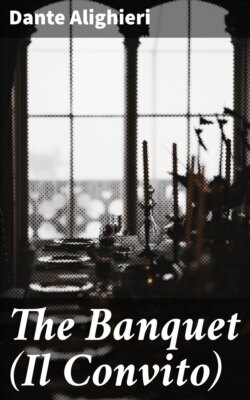Читать книгу The Banquet (Il Convito) - Dante Alighieri - Страница 11
На сайте Литреса книга снята с продажи.
CHAPTER V.
ОглавлениеTable of Contents
Since this bread is now cleared of accidental spots, it remains to excuse it from a substantial one, that is for being in my native tongue and not in Latin; which by similitude one may term, of barley-meal and not of wheaten flour. And from this it is briefly excused by three reasons which moved me to choose the one rather than the other. One springs from the avoidance of inconvenient Unfitness: the second from the readiness of well-adjusted Liberality; the third from the natural Love for one's own Native Tongue. And these things, with the grounds for them, to the staying of all possible reproof, I mean in due order to reason out in this form.
That which most adorns and commends human actions, and which most directly leads them to a good result, is the use of dispositions best adapted to the end in view; as the end aimed at in knighthood is courage of mind and strength of body. And thus he who is ordained to the service of others, ought to have those dispositions which are suited to that end; as submission, knowledge and obedience, without which any one is unfit to serve well. Because if he is not subject to each of these conditions, he proceeds in his service always with fatigue and trouble, and but seldom continues in it. If he is not obedient, he never serves except as in his wisdom he thinks fit, and when he wills; which is rather the service of a friend than of a servant. Hence, to escape this disorder, this commentary is fit, which is made as a servant to the under-written Songs, in order to be subject to these, and to each separate command of theirs. It must be conscious of the wants of its lord, and obedient to him, which dispositions would be all wanting to it if it were a Latin servant, not a native, since the songs are all in the language of our people. For, in the first place, if it had been a Latin servant he would be not a subject but a sovereign, in nobility, in virtue, and in beauty; in nobility, because the Latin is perpetual and incorruptible; the language of the vulgar is unstable and corruptible. Hence we see in the ancient writings of the Latin Comedies and Tragedies that they cannot change, being the same Latin that we now have; this happens not with our native tongue, which, being home-made, changes at pleasure. Hence we see in the cities of Italy, if we will look carefully back fifty years from the present time, many words to have become extinct, and to have been born, and to have been altered. But if a little time transforms them thus, a longer time changes them more. So that I say that, if those who departed from this life a thousand years ago should come back to their cities, they would believe those cities to be inhabited by a strange people, who speak a tongue discordant from their own. On this subject I will speak elsewhere more completely in a book which I intend to write, God willing, on the "Language of the People."
Again, the Latin was not subject, but sovereign, through virtue. Each thing has virtue in its nature, which does that to which it is ordained; and the better it does it so much the more virtue it has: hence we call that man virtuous who lives a life contemplative or active, doing that for which he is best fitted; we ascribe his virtue to the horse that runs swiftly and much, to which end he is ordained: we see virtue of a sword that cuts through hard things well, since it has been made to do so. Thus speech, which is ordained to express human thought, has virtue when it does that; and most virtue is in the speech which does it most. Hence, forasmuch as the Latin reveals many things conceived in the mind which the vulgar tongue cannot express, even as those know who have the use of either language, its virtue is far greater than that of the vulgar tongue.
Again, it was not subject, but sovereign, because of its beauty. That thing man calls beautiful whose parts are duly proportionate, because beauty results from their harmony; hence, man appears to be beautiful when his limbs are duly proportioned; and we call a song beautiful when the voices in it, according to the rule of art, are in harmony with each other. Hence, that language is most beautiful in which the words most fitly correspond, and this they do more in the Latin than in the present Language of the People, since the beautiful vulgar tongue follows use, and the Latin, Art. Hence, one concedes it to be more beautiful, more virtuous and more noble. And so one concludes, as first proposed; that is, that the Latin Commentary would have been the Sovereign, not the Subject, of the Songs.
